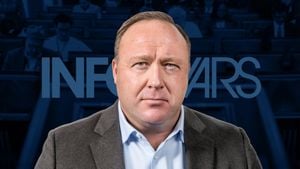Brian Thompson, the chief executive of UnitedHealthcare, was tragically shot dead last week, sending shockwaves throughout the healthcare and business sectors. Thompson was fatally shot on December 4 outside the Hilton Hotel in Manhattan, as he was on his way to an investor conference, which quickly escalated the situation leading to the arrest of the prime suspect, 26-year-old Luigi Mangione.
This shocking incident not only claimed the life of Thompson but also raised serious concerns about safety among healthcare executives across the nation. Following the murder, there has been significant media coverage and public outcry—adding to the narrative of discontent with the healthcare industry. Evidence gathered by the police indicates Mangione’s fingerprints matched those found near the crime scene, including on the weapon used during the shooting. On Wednesday, New York's police commissioner, Jessica Tisch, confirmed the gun recovered from Mangione was consistent with shell casings at the scene of the crime.
Further investigations revealed troubling details about Mangione’s state of mind. According to sources, writings found with him hinted at his disdain for corporate greed, particularly focusing on health insurance companies. A law enforcement bulletin described his writings as expressing anger against “parasitic” health insurance firms, referencing the expensive nature of healthcare in the U.S. Despite the mounting evidence against him, Mangione's attorney, Thomas Dickey, has emphasized the principle of innocent until proven guilty, calling for caution before rushing to judgment.
Authorities reported Mangione had previously visited local Starbucks prior to the incident, and was seen cycling away on e-bikes after committing the crime. The police were alerted to his presence on December 9 after someone recognized him at a McDonald's location nearly 230 miles from the crime scene. Upon his arrest, Mangione was found with various forms of identification, some of which were fraudulent, and evidence indicating he was trying to conceal his digital footprint, carrying bags to block signals to his electronic devices.
The aftermath of this horrific murder has stirred not just alarm but also sparked intense discussion online. Following the shooting, posters emerged around Manhattan depicting healthcare CEOs with the implication of them being targets. They read messages like, “Wanted. Denying medical care for corporate profit,” and referenced phrases allegedly linked to Mangione's manifesto. This has raised real fears among healthcare executives, prompting law enforcement to increase their vigilance amid what appears to be a rise in sentiments advocating violence against corporate entities.
Adding to the complex nature of this case, Mangione, who had previously been active online discussing his chronic health issues, appears to have struggled with severe back pain. Evidence suggests he had sought medical help for years, which perhaps contributes to the emotional turmoil leading to his actions. He has expressed frustration at perceived injustices within the healthcare system on platforms like Reddit, steering discussions toward systemic failures.
Legal proceedings have now commenced against Mangione. After challenging his extradition to New York, he has managed to delay the process which could mean he stays jailed longer, opening the door to more investigations as authorities piece together the events leading up to Thompson’s death. His legal team’s argument is focusing on the notion of insufficient evidence solely linking him to the act of murder.
The dual narratives surrounding Mangione as both suspect and symbol of broader discontent within the healthcare system complicate public perception. While many decry the violence, others reflect on the systemic failures evident within healthcare services and how it shapes individual lives. Statements made by ordinary citizens online have illustrated their struggles with insurance companies, echoing sentiments similar to those expressed by Mangione.
This discontent is evident with social media trends and discussions, some individuals rallying behind Mangione’s actions as if they are the actions of someone starting needed conversations around healthcare reform; there are even items for sale referencing him on platforms like Etsy and eBay. The online support shows the growing trend of seeing such violent acts not only as crimes but as politically charged statements fueled by societal discontent. The NYPD issued cautions about potential threats toward healthcare leaders, evidencing the increased sense of urgency around personal safety among them.
With the case still developing, scrutiny will be placed not only on Mangione’s actions but the larger narrative surrounding healthcare complaints and the actions of those errantly rallying against perceived institutional injustice. Every new piece of evidence or statement will likely stir the pot of public sentiment, highlighting the intersection of crime, industry, and what many feel is systemic oppression by elite corporate structures.
Brian Thompson's murder may be just one tale within the complex and often dark narrative of corporate interactions with the general public, emphasizing deep-rooted discontent and dissatisfaction. His legacy, alongside the tragic manner of his death, will inevitably echo through discussions about healthcare reform and corporate responsibility, as the nation watches closely what happens next with Mangione's legal processes and the revelations yet to come.



